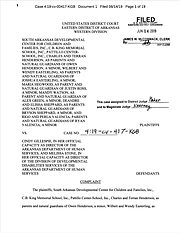A rule that the state Department of Human Services began applying to some developmentally disabled children in Arkansas last summer and will begin applying to more of them on July 1 unless stopped by court order violates the Medicaid Act, a federal lawsuit alleges.
The suit was filed Friday on behalf of three facilities that provide day treatment services for eligible children up to 6 years old, and parents of six affected children between the ages of 6 months and 3 years.
The facilities are the South Arkansas Development Center for Children and Families Inc. in El Dorado; the C.B. King Memorial School Inc., based in McGehee; and Pattillo Center-School Inc., headquartered in DeWitt.
Attorney Martin Bowen of North Little Rock, who sued the directors of the state Department of Human Services and its Division of Developmental Disabilities Services on behalf of the plaintiffs, wants U.S. District Judge Kristine Baker to declare that the rule violates federal law and order the state to not apply it.
The rule denies eligibility for day habilitation services prescribed for children unless their primary-care physician also prescribes occupational therapy, physical therapy, speech therapy or nursing services. Bowen said children may not be denied mandatory services simply because they fail to qualify for other services.
"Many children who qualify for day habilitation services have not been prescribed occupational therapy, physical therapy, speech therapy or nursing services," Bowen said. "The rule deprives these children of the day habilitation they need to obtain the maximum reduction of their developmental disabilities and restoration to their best possible functional level."
Bowen said the rule went into effect for new applicants on July 1, 2018, depriving hundreds of Medicaid-eligible children from getting day habilitation services ordered by their physicians, and will begin applying in two weeks to children who were already in the program when the rule took effect last summer but were grandfathered in.
"Hundreds of additional children will lose day habilitation services if the rule is not enjoined prior to that time," he said.
He contends that at least 276 children have been affected: 140 who otherwise would have been eligible for day services at the El Dorado facility, 110 at the McGehee-based facility and 26 at the DeWitt-based corporation.
Bowen is asking Baker to grant immediate relief in the form of a temporary restraining order and a preliminary injunction that would keep the rule from being enforced while the matter is litigated, unless she strikes the rule down permanently in the interim.
The lawsuit states that thousands of Medicaid-eligible children in Arkansas suffer developmental disabilities and delay. It says that under the Medicaid Act's early and periodic screening, diagnosis and treatment provisions, they are eligible for any medical or remedial services recommended by a physician that are aimed at "the maximum reduction of physical or mental disability and restoration of an individual to the best possible functional level."
Experts on the treatment of developmental disabilities in children up to age 6 say that such disabilities are effectively treated with early intervention day treatment services, such as those available to Medicaid-eligible children in Arkansas under the Early Intervention Day Treatment program, the suit states.
When prescribed by physicians for such children, the "day habilitation services" provided through the program "are mandated by" the early and periodic screening provisions of the Medicaid Act, the lawsuit asserts.
Bowen said the department has enacted a rule, known as the "one therapy" rule, that denies the prescribed services, however, unless the patient is also prescribed at least one of the other listed services.
Amy Webb, spokesman for the Department of Human Services, declined to comment on the lawsuit Monday because it is ongoing litigation.
Bowen said Monday that the services at issue are the same ones that were litigated years ago under the names of different parties before U.S. District Judge Billy Roy Wilson. The case played out over a number of years, always surviving motions to dismiss, but it was settled without being judicially decided after one of the biggest plaintiffs, Pediatric Specialty Care, was sold.
A Section on 06/18/2019
